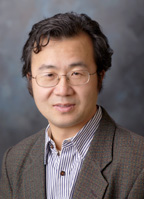In Vitro Expansion of Hematopoietic Stem Cells by Inhibition of Both GSK3 and p38 Signaling. Journal Article
Local Library Link: Find It @ Loyola
| Authors: | Li, J; Zhang, L; Yin, L; Ma, N; Wang, T; Wu, Y; Wang, M; Yang, X; Xu, H; Hao, C; Li, W; Wei, W; Xu, Y; Zhang, F; Breslin, P; Zhang, J |
| Article Title: | In Vitro Expansion of Hematopoietic Stem Cells by Inhibition of Both GSK3 and p38 Signaling. |
| Abstract: | Hematopoietic stem cell (HSC) transplantation therapy is one of the most effective treatments for life-threatening hematopoietic diseases. Bone marrow (BM) and mobilized peripheral blood are the major sources of HSCs, but these resources are limited by a paucity of human leukocyte antigen (HLA)-matched donors. Umbilical cord blood (UCB) is the most promising alternative to obtain HSCs for transplantation therapy. However, UCB transplantation therapy is limited by low numbers of HSCs per unit of UCB. In vitro HSC expansion is believed to be the most effective and applicable strategy to address this issue. Here we report that a moderate concentration of GSK3 inhibitor promotes HSC expansion by inducing moderate levels of ß-catenin activity in HSCs. However, such a concentration of GSK3 inhibitor also stimulates myeloid cells to produce inflammatory cytokines, which attenuate HSC expansion by inducing p38 activation. Thus, when unpurified HSCs were used in culture, inhibition of p38-induced inflammatory cytokine signaling was required to ensure HSC expansion induced by the low concentration of GSK3 inhibitor. Our study suggests that the combination of a moderate concentration of p38 inhibitor plus a GSK3 inhibitor synergistically promotes the expansion of both murine BM HSCs and human UCB HSCs. |
| Journal Title: | Stem cells and development |
| ISSN: | 1557-8534; 1547-3287 |
| Publisher: | Unknown |
| Date Published: | 2019 |


